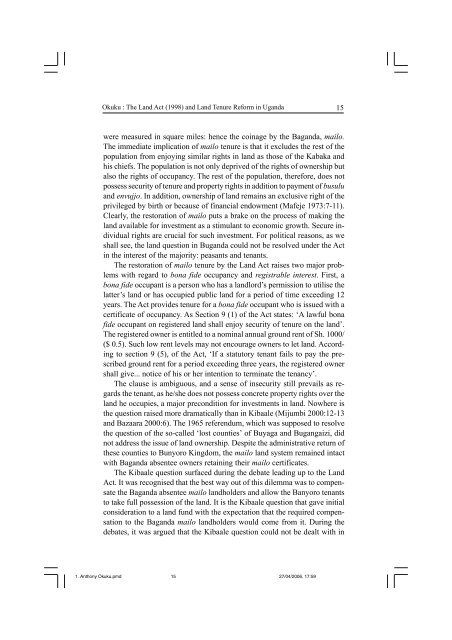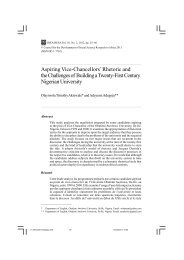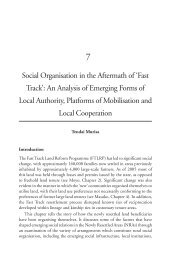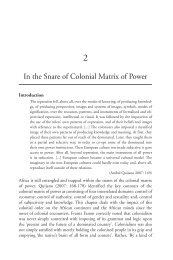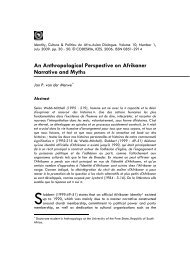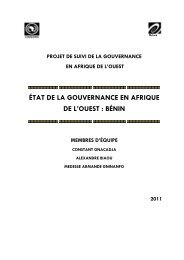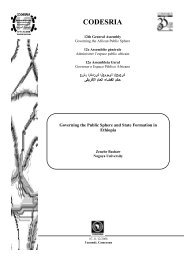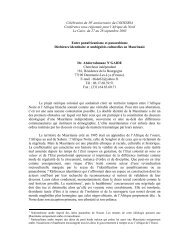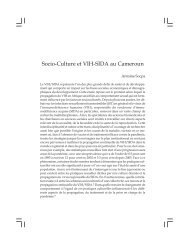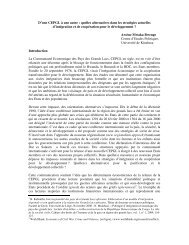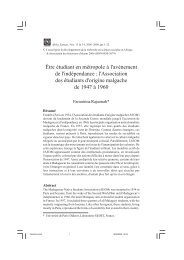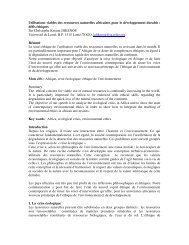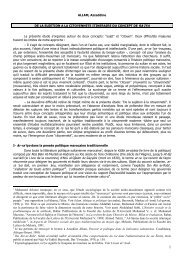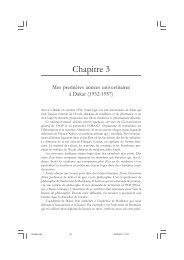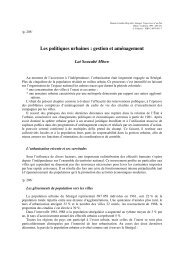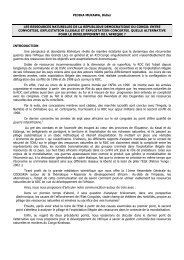and Land Tenure Reform in Uganda - codesria
and Land Tenure Reform in Uganda - codesria
and Land Tenure Reform in Uganda - codesria
You also want an ePaper? Increase the reach of your titles
YUMPU automatically turns print PDFs into web optimized ePapers that Google loves.
Okuku : The L<strong>and</strong> Act (1998) <strong>and</strong> L<strong>and</strong> <strong>Tenure</strong> <strong>Reform</strong> <strong>in</strong> Ug<strong>and</strong>a<br />
were measured <strong>in</strong> square miles: hence the co<strong>in</strong>age by the Bag<strong>and</strong>a, mailo.<br />
The immediate implication of mailo tenure is that it excludes the rest of the<br />
population from enjoy<strong>in</strong>g similar rights <strong>in</strong> l<strong>and</strong> as those of the Kabaka <strong>and</strong><br />
his chiefs. The population is not only deprived of the rights of ownership but<br />
also the rights of occupancy. The rest of the population, therefore, does not<br />
possess security of tenure <strong>and</strong> property rights <strong>in</strong> addition to payment of busulu<br />
<strong>and</strong> envujjo. In addition, ownership of l<strong>and</strong> rema<strong>in</strong>s an exclusive right of the<br />
privileged by birth or because of f<strong>in</strong>ancial endowment (Mafeje 1973:7-11).<br />
Clearly, the restoration of mailo puts a brake on the process of mak<strong>in</strong>g the<br />
l<strong>and</strong> available for <strong>in</strong>vestment as a stimulant to economic growth. Secure <strong>in</strong>dividual<br />
rights are crucial for such <strong>in</strong>vestment. For political reasons, as we<br />
shall see, the l<strong>and</strong> question <strong>in</strong> Bug<strong>and</strong>a could not be resolved under the Act<br />
<strong>in</strong> the <strong>in</strong>terest of the majority: peasants <strong>and</strong> tenants.<br />
The restoration of mailo tenure by the L<strong>and</strong> Act raises two major problems<br />
with regard to bona fide occupancy <strong>and</strong> registrable <strong>in</strong>terest. First, a<br />
bona fide occupant is a person who has a l<strong>and</strong>lord’s permission to utilise the<br />
latter’s l<strong>and</strong> or has occupied public l<strong>and</strong> for a period of time exceed<strong>in</strong>g 12<br />
years. The Act provides tenure for a bona fide occupant who is issued with a<br />
certificate of occupancy. As Section 9 (1) of the Act states: ‘A lawful bona<br />
fide occupant on registered l<strong>and</strong> shall enjoy security of tenure on the l<strong>and</strong>’.<br />
The registered owner is entitled to a nom<strong>in</strong>al annual ground rent of Sh. 1000/<br />
($ 0.5). Such low rent levels may not encourage owners to let l<strong>and</strong>. Accord<strong>in</strong>g<br />
to section 9 (5), of the Act, ‘If a statutory tenant fails to pay the prescribed<br />
ground rent for a period exceed<strong>in</strong>g three years, the registered owner<br />
shall give... notice of his or her <strong>in</strong>tention to term<strong>in</strong>ate the tenancy’.<br />
The clause is ambiguous, <strong>and</strong> a sense of <strong>in</strong>security still prevails as regards<br />
the tenant, as he/she does not possess concrete property rights over the<br />
l<strong>and</strong> he occupies, a major precondition for <strong>in</strong>vestments <strong>in</strong> l<strong>and</strong>. Nowhere is<br />
the question raised more dramatically than <strong>in</strong> Kibaale (Mijumbi 2000:12-13<br />
<strong>and</strong> Bazaara 2000:6). The 1965 referendum, which was supposed to resolve<br />
the question of the so-called ‘lost counties’ of Buyaga <strong>and</strong> Bugangaizi, did<br />
not address the issue of l<strong>and</strong> ownership. Despite the adm<strong>in</strong>istrative return of<br />
these counties to Bunyoro K<strong>in</strong>gdom, the mailo l<strong>and</strong> system rema<strong>in</strong>ed <strong>in</strong>tact<br />
with Bag<strong>and</strong>a absentee owners reta<strong>in</strong><strong>in</strong>g their mailo certificates.<br />
The Kibaale question surfaced dur<strong>in</strong>g the debate lead<strong>in</strong>g up to the L<strong>and</strong><br />
Act. It was recognised that the best way out of this dilemma was to compensate<br />
the Bag<strong>and</strong>a absentee mailo l<strong>and</strong>holders <strong>and</strong> allow the Banyoro tenants<br />
to take full possession of the l<strong>and</strong>. It is the Kibaale question that gave <strong>in</strong>itial<br />
consideration to a l<strong>and</strong> fund with the expectation that the required compensation<br />
to the Bag<strong>and</strong>a mailo l<strong>and</strong>holders would come from it. Dur<strong>in</strong>g the<br />
debates, it was argued that the Kibaale question could not be dealt with <strong>in</strong><br />
1. Anthony Okuku.pmd 15<br />
27/04/2006, 17:59<br />
15


